________________
124
BILAGAVADGITA.
are declared in the enumeration of qualities' (to be) of three classes only, according to the difference of qualities. Hear about these also as they really are. Know that knowledge to be good, by which (a man) sees one entity, inexhaustible, and not different in all things (apparently different ? (from one another). Know that knowledge to be passionate, which is (based) on distinctions * (between different entities), which sees in all things various entities of different kinds. And that is described as dark, which clings to one created (thing) only as everything, which is devoid of reason, devoid of real principle, and insignificant. That action is called good, which is prescribed, which is devoid of attachment, which is not done from (motives of) affection or aversion, (and which is done by one not wishing for the fruit. That is described as passionate, which (occasions) much trouble, is performed by one who wishes for objects of desire, or one who is full of egotism. The action is called dark, which is commenced through delusion, without regard to consequences, loss, injury, or strength. That agent is called good, who has cast off attachment, who is free from egotistic talk, who is possessed of courage and energy, and unaffected by success or ill-success. That agent is called passionate, who is full of affections
"The system of Kapila.
· Cl. p. 104. • Cf. Kathopanishad, p. 129.
• Reason=argument in support; real principle=truth, view of things as they are; insignificant, i.e. in comprehensiveness.
* I.e. 'pride of learning,' &c., Sankara; 'egoism,' Râmânuga.
• Consequences=good or evil resulting ; loss=of wealth or strength; injury=lo others; strength = one's own capacity.
il.e. for children,' &c., according to Siidhara; for the action, according to others.
Digitized by Google




